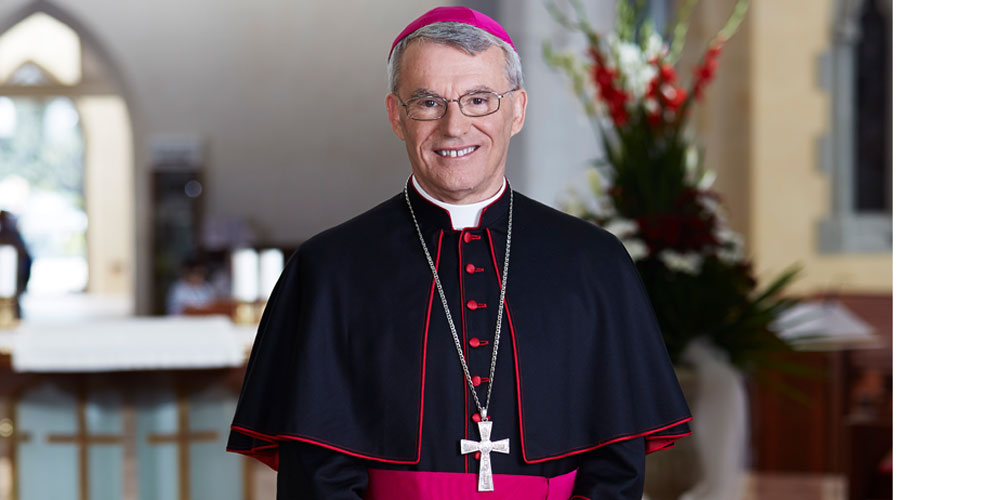I was surprised and somewhat daunted at my election as the new president of the Bishops Conference. It is an important role and not one that I had ever imagined I might be asked to take on.
At the same time, I was and am conscious of the trust the bishops of Australia have placed in me. I will certainly do my best to repay that trust and to work collaboratively with the bishops to ensure that we remain united in our service of God’s people here in Australia.
One of the most important aspects of the Bishops Conference is our readiness to listen to and learn from each other’s experience. Every part of the Church in Australia has something to offer the wider Church.
Beyond the important decisions made by the Fifth Plenary Council of Australia I think the real legacy lies in our experience, over the four-plus years of the Plenary Council journey of “lived synodality”. Pope Francis often insists that this must be the way for the Church as we move into an uncertain future.
 Archbishop Tim Costelloe
Archbishop Tim Costelloe
All of us, sisters and brothers in Christ, are being called to walk together, listening deeply to each other. For many of us, the long journey of the Plenary Council has been an introduction to this way of living our faith.
Now we will need to deepen our understanding of this reality by participating in it. My sense is that as a community of faith we are only at the beginning of this journey. Our listening is ultimately a listening to God, in all the many ways God speaks to us. I think we now need to attend carefully to all the ways in which God speaks to us.
I have seen, more clearly than ever, the deep desire in so many people for the Church to be authentic and faithful. The horrors of the sexual abuse crisis, and the extent of the suffering inflicted on the young and the vulnerable, has not destroyed the Church, although it has, to our shame, destroyed the faith of many in the Church.
What it has done, however, is to reawaken in so many people a desire for the Church to be what it is called to be: a living and effective sign and instrument of the Lord’s presence and action in our world.
I have also learnt how difficult it has been for so many of us in the Church to really enter into true discernment. I say this because I detected in others, and in myself, the powerful temptation to believe that what I thought was best for the Church must inevitably also be what God desires for the Church. The challenge, of course, is that other equally committed and sincere Catholics see things very differently.

We have a long way to go in trying to understand how to discern the work, and the promptings, of the Spirit when good and faithful people see things very differently. The temptation of arrogance or spiritual pride needs the antidote of Christian humility.
It is almost a cliché to say that the values of the Church and the values of the society in which we live are growing further and further apart. Clearly the Church does not hold the privileged position in our society that it once had.
In such a situation, my firm conviction is that we should follow the advice given by Pope Benedict (and, I think, by John Paul II before him) and reiterated by Pope Francis. We should endlessly propose but never impose our beliefs on others.
I often speak of the “Catholic worldview” by which I mean the way in which, in our Catholic tradition, we understand what it means to be a human person, created in the image and likeness of God and called by God, in and through God’s self-revelation in Christ, to live in relationship with God, with others and with ourselves.
There is a coherent Catholic vision, based on key presuppositions (God exists, God is made known fully and finally in Jesus Christ, Jesus Christ establishes the Church and animates it through his Spirit to be the living sacrament of his presence) which means that the Church has a wisdom to offer our world as a precious gift.
Gifts can only be offered, never forced on people, and people are free to receive or reject the gifts. We are called to reveal the beauty of the gift both by what we say and what we do, and to be sure that we offer the gift in its fullness as given to us by God.
It is one of the roles of the bishop to ensure that the gift is maintained in its integrity; to do otherwise would be to fail and dishonour God who is the designer and giver of the gift, and to fail God’s people who have a right to receive the gift in its fullness.
Of course, it is the faith of the Church, and not necessarily the bishop’s particular and personal interpretation of it, which bishops are called to safeguard for the sake of God’s people.

This article originally appeared in the Spring 2022 edition of the Salesian Bulletin, which is available now!

